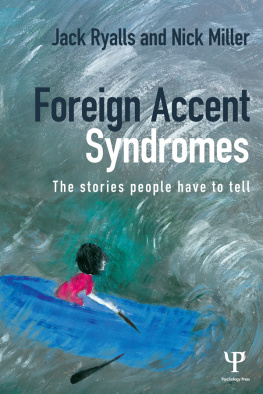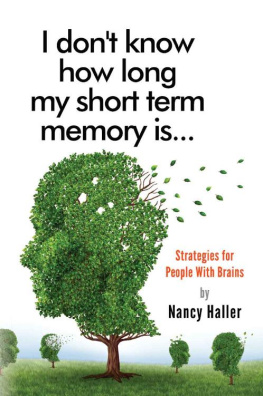Foreign Accent Syndromes
What does it feel like to wake up one day speaking with a foreign accent from a country one has never visited? Why does someone wake up doing this? This book seeks to portray the broad and diverse experiences of individuals with a rare neurological speech disorder called Foreign Accent Syndrome (FAS). Through a combination of personal testimony and scientific commentary, the book aims to shed unprecedented light on the understanding of FAS by elucidating the complex links between how the brain produces speech, how listeners perceive speech, and the role that accent plays in our perception of self and others.
The of the book provides a comprehensive introduction to FAS and covers a number of key subject areas, including:
the definition and phenomenology of FAS
a history of research on FAS
the causes and psychosocial consequences of FAS
a guide to further reading and a glossary of specialised terms.
The material in provides a unique insight into the condition through personal testimony and accounts from family members. This collection of 28 testimonies from across the world underlines the importance of listening carefully to patients explaining their cases in their own words. The final section contains a questionnaire for use by clinicians to support case-history taking.
The authors are two leading global experts on FAS, and this is the first volume of its kind to provide such a broad and comprehensive examination of this rare and poorly understood condition. It will be of great interest to practising clinicians in neurology, psychiatry, psychology, and speech and language therapy/pathology, as well as students in health disciplines relevant to neurorehabilitation, linguists, and also to families and caregivers.
Jack Ryalls is Professor at the Department of Communication Sciences and Disorders at the University of Central Florida, USA. In addition to FAS, his research areas also include aphasia, normal aging, right hemisphere brain damage, Parkinsonism, Friedreichs ataxia and Alzheimers disease.
Nick Miller is Professor of Motor Speech Disorders at the Institute of Health and Society, Newcastle University, UK. His teaching and clinical practice have covered all aspects of motor speech disorders as well as areas of neuro psychology, aphasia and rehabilitation in neurological disorders. His main focus in research has been on speech, voice and swallowing changes in Parkinsons and after stroke, with involvement with FAS arising out of the latter.
Foreign Accent Syndromes
The stories people have to tell
Jack Ryalls and Nick Miller
First published 2015
by Psychology Press
27 Church Road, Hove, East Sussex BN3 2FA
and by Psychology Press
711 Third Avenue, New York, NY 10017
Psychology Press is an imprint of the Taylor & Francis Group, an informa business
2015 Jack Ryalls and Nick Miller
The right of Jack Ryalls and Nick Miller to be identified as author of this work has been asserted by them in accordance with sections 77 and 78 of the Copyright, Designs and Patents Act 1988.
All rights reserved. No part of this book may be reprinted or reproduced or utilised in any form or by any electronic, mechanical, or other means, now known or hereafter invented, including photocopying and recording, or in any information storage or retrieval system, without permission in writing from the publishers.
Trademark notice: Product or corporate names may be trademarks or registered trademarks, and are used only for identification and explanation without intent to infringe.
British Library Cataloguing in Publication Data
A catalogue record for this book is available from the British Library
Library of Congress Cataloging in Publication Data
Ryalls, John H., 1954
Foreign accent syndromes: the stories people have to tell/Jack Ryalls and Nick Miller. 1 Edition.
pages cm
Includes bibliographical references and index.
1. Speech disorders. 2. Communicative disorders. 3. Neurolinguistics.
I. Miller, Nick. II. Title.
RC423.R8962 2014
616.855dc23
2013050466
ISBN: 978-1-84872-152-4 (hbk)
ISBN: 978-1-84872-153-1 (pbk)
ISBN: 978-1-315-87089-2 (ebk)
Typeset in Bembo and Gill Sans
by Florence Production Ltd, Stoodleigh, Devon, UK
Contents
PART I
Introduction
JACK RYALLS
NICK MILLER
PART II
Personal testimonies
Anonymous:
Ron Kochut:
Jeffrey Barquero Salazar:
Martina Bodeck:
Annabel:
Claire Coleman:
Wendy Hasnip:
Kath Lockett and family:
June Maldonado:
Julie Matthias and family:
Debie Royston:
Kay Russell-Iliffe:
Teshera Bowser:
Kenley Byrd:
Gretchen Daniel and family:
Julie Dieschbourg:
Joy Curls
Nancy Haller:
Kimberly Martens:
Karen Bailey Mullinix:
Alice Murphy:
Cindy J. Neely-Langdon:
Cindylou Vedin Romberg:
Rose Shuff:
Ellen Spencer:
Bernadette West:
Paula Westberry and family:
Olga Boscn:
PART III
Additional resources
JILL TAYLOR, CHLOE HOWE AND NICK MILLER
I would like to acknowledge that part of the idea for this book was inspired by the popular and compelling course Brain Stories given by my colleague Joe DiNapoli at my home institution, and the many stimulating conversations that Foreign Accent Syndrome has occasioned. It is especially appropriate for me to recognise my first exposure to Foreign Accent Syndrome through my mentor Sheila Blumstein more than thirty years ago (already!) And, in turn, the debt to her mentors Harold Goodglass and Roman Jakobson. Nanos gigantum humeris insidentes. So, I would like to dedicate this book to her.
Jack Ryalls, Orlando, October 2013
With acknowledgement of the boundless insights into communication, its changes, and the human condition afforded by all those with Foreign Accent Syndrome whom I have had the privilege to encounter. With thanks for the inspiration of Jennifer Gurd, who has been a shining light in the field of FAS and neuropsychology for many decades.
Dedicated to the women in my life, Irene, Jane, Fiona, Catriona, rla.
Nick Miller, Newcastle, October 2013
Jack Ryalls
The purpose of this book is to relay the personal experience of Foreign Accent Syndrome (FAS). We seek to portray the broad and diverse experiences of those who have experienced this curious but compelling disorder; and who better to speak about this than those individuals who have lived with FAS themselves? For those who have, or have had FAS and for those who encounter these individuals, whether in clinic, home or the media, we also offer some insights from the history of FAS and comments from the science behind the condition.
We have purposely used syndromes in the title, because it has become clear that there is more than one disorder, if disorder is the appropriate word. We wish to emphasise the breadth of experiences and aetiologies; to focus on how individual the experience is, despite the congruencies. While there are many different theories put forward to explain FAS, in this book we wanted to avoid a potentially turgid tome on the neurology, physiology, neuropsychology and phonetics of FAS, and gather together as many human experiences as possible. While it has been a century since a similar condition was described by the French neurologist Pierre Marie, there is not yet a single accepted theory for FAS.
Next page













